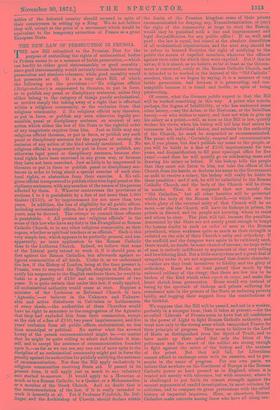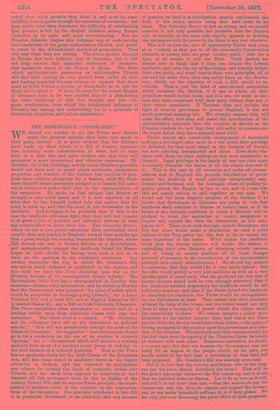THE NEW LAW OF PERSECUTION IN PRUSSIA.
TFIF1 new Bill submitted to the Prussian Diet for the purpose of controlling the rights of ecclesiastical bodies in Prussia seems to us a measure of feeble persecution,—which can hardly be either good statesmanship or good morality ; since good statesmanship would certainly choose between strong persecution and absolute tolerance, while good morality would not persecute at all. It is a very short Bill, of which the following are the provisions :—" No religious official (Religionsdiener) is empowered to threaten, to put in force, or to publish any penal or disciplinary sentences, unless they either belong to the category of things purely ecclesiastical, or involve simply the taking away of a right that is effectual within a religious community, or the exclusion from that religions community. 2. No religious official may threaten, or put in force, or publish any even otherwise legally per- missible, penal or disciplinary sentence, on account of any action which either the law of the State or the rightful order of any magistrate requires from him. Just as little may any religious official threaten, or pat in force, or publish any such penal or disciplinary sentence for the purpose of causing the omission of any action of the kind already mentioned. 3. No religions official is empowered to put in force or publish any otherwise legal penal or disciplinary sentence, because elec- toral rights have been exercised in any given way, or because they have not been exercised. Just as little is he empowered to threaten or put in force or publish penal or disciplinary sen- tences in order to bring about a special exercise of such elec- toral rights, or abstention from their exercise. 4. No reli- gions official is empowered to publish otherwise legal penal or dis- ciplinary sentences, with any mention of the names of the persons affected by them. 5. Whoever contravenes the provisions of sections 1 to 4 is punishable by a fine of not more than 1,000 thalers (£150), or by imprisonment for not more than two years. In addition, the loss of eligibility for all public offices, including ecclesiastical offices, for a period of from one to five years, may be decreed. The attempt to commit these offences is punishable. 6. All persons are religions officials' in the sense of this law who have any duty in the Evangelical or Roman Catholic Church, or in any other religious community, as their organs, whether as spiritual teachers or as officials." Such is this very simple law, which appears to be perfectly general, and has, apparently, no more application to the Roman Catholic than to the Lutheran Church. Indeed, we believe that some of the Liberal party intend to work it, if it should pass, at first against the Roman Catholics, but aftewards against re- ligious communities of all kinds. Under it, as we understand the law, if the Bishop of London, being at the time present in Prussia, were to suspend the English chaplain in Berlin, and notify his suspension to the English residents there, he would be liable to a penalty of £150 and an imprisonment of two years. It is quite certain that under this law, if really applied, all ecclesiastical authority would cease at once. Suppose a minister of the Lutheran or Reformed Church to turn Agnostic,'—or believer in the Unknown and Unknow- able and active disbeliever in Calvinism or Lutheranism of every shade,—the authorities of these Churches would have no right to announce to the congregation of the Agnostic that they had excluded him from their communion, except at the risk of a fine of .£150, two years' imprisonment, and five years' exclusion from all public offices, ecclesiastical, no less than municipal or political. No matter what the avowed heresy of the person excommunicated might be,—no matter that he might be quite willing to admit and declare it him- self, and to accept the sentence of excommunication founded upon it,—as far as we can see, any one out of mere spite to the discipline of an ecclesiastical community might put in force the penalty against its authorities for publicly notifying the sentence of .excommunication. Nor does the Bill apply exclusively to religious communities receiving State aid. If passed in its present form, it will apply just as much to any voluntary sect started to-morrow. It would apply to a Moravian as much as to a Roman Catholic, to a Quaker, or a Mohammedan, or a member of the Greek Church. And no doubt that is the recommendation of the law, if it is really intended to work it honestly at all. Yet if Professor Friedrich, Dr. Dig- linger, and the Archbishop of Utrecht should declare within
I the limits of the Prussian kingdom some of their priests I excommunicated for denying, say, Transubstantiation, or (say) the right of the community at large to elect the Bishop, would they be punished with a fine and imprisonment and legal disqualification for any public office ? If so, well and good ; the law is equal, but aimed at the absolute demolition of all ecclesiastical organisations, and the next step should be to refuse to learned Societies the right of notifying to the public the names of expelled members, whatever the offence against their rules for which they were expelled. But if this be not so, if it is aimed, as we believe, so far at least as the Govern- ment is concerned, solely at the Roman Catholic Church, and is intended to be worked in the interest of the "Old Catholic" seceders, then, as we began by saying, it is a measure of very feeble persecution, bad because it is persecuting, and con- temptible because it is timid and feeble, in spite of being persecuting.
Of course, what the German public expect is that the Bill will be worked something in this way. A priest who rejects, perhaps, the dogma of Infallibility, or who has embraced some other heresy,—say the Arian, or the Nestorian, or the Sabellian heresy,—or who wishes to marry, and does not wish to give up his salary as a priest,—will, as soon as this Bill is law, quietly declare his views, when his bishop will tell him that unless he renounces his individual choice, and submits to the authority of the Church, he must be suspended or excommunicated. The priest will reply, Certainly, suspend and excommunicate me, if you please, but don't publish my name to the people, or you will be liable to a fine of £150, imprisonment for two years, and disqualification to fill your episcopal office for five years',—and then he will quietly go on celebrating mass and drawing his salary as before. If the bishop tells the people that they must not listen to him, nor take the offices of the Church from his hands, or declares his name to the Government as unfit to receive a salary, the bishop will really be liable to them penalties ; and if not, he will be unfaithful to the Roman Catholic Church, and the body of the Church will be riven in sunder. Thus, it is supposed that not merely the "Old Catholics," but all other heretics will be protected within the body of the Roman Church,—in which case the whole glory of the external unity of that Church will be no more,—or else the Church will have its bishops in prison, its priests in discord, and its people not knowing whom to resist and whom to obey. The plan will fail, because the penalties denounced by the State are not nearly great enough to tempt the human frailty in such an order of men as the Roman priesthood, whose weakness quite as much as their strength is enlisted on the side of their Church's unity and orthodoxy. If the scaffold and the dungeon were again to be ruthlessly used, there would, no doubt, be some chance of success; no large order of men is entirely indifferent to arguments of that very telling and bewildering kind. But a little martyrdom and a great deal of sympathy under it, are not argumentikof that drastic character, —rather are they fresh incentives to fidelity and the glory of orthodoxy. Rome has at least gained thus much by the enforced celibacy of the clergy, that there are few ties to be broken of the kind which relax esprit de cmps, and make the heart shrink from persecution. Rome would win instead of losing by the spectacle of bishops and priests suffering for conscience' sake in the prisons of the State, or enduring poverty boldly, and begging their support from the contributions of the faithful.
We suppose that the Bill will be passed, and not in a weaker, probably in a stronger form, than it takes at present,—for the so-called 'Liberals' of Prussia seem to have lost all confidence in the power of Light to fight Roman Catholic authority, and trust now only to the strong arms which vanquished France for their principle of progress. They seem to believe in the Lord of Hosts as distinguished from the Spirit of Truth, and to have made up their mind that only the baton of the policeman and the sword of the soldier are strong enough to fight against the mitre of the bishop and the soutane of the priest. But they will fail, for Liberalism cannot afford to exchange arms with its enemies, and to per-
secute in the name of progress. For our own parts, we believe that nowhere on the Continent of Europe is the Roman Catholic power so hard pressed as in England, where it is treated not merely with tolerance, but with courtesy, where it is challenged to pat forth its utmost strength against the earnest arguments of candid investigation, to meet criticism by criticism, and to compare its great pretensions with the sifted history of impartial inquirers. Here, as elsewhere, Roman Catholics make converts among those who have all along con-
ceded their main premiss that there is, and must be, some infallible human guide through the mysteries of revelation ; but here, much more than elsewhere, the difficulty of establishing that premiss is felt by the deepest thinkers among Roman Catholics to be more and more overwhelming. But the Prussian Liberals despise this toilsome way of undermining the foundations of the great authoritative Church, and prefer to resort to the old-fashioned method of persecution. They will reap what they are sowing. The freest private thought in Europe has been hitherto that of Germany, but it will not long survive this shameful confession of weakness, this spasmodic terror of the Church of Rome. The State which authoritatively persecutes an authoritative Church will find itself cutting its own ground from under its feet, and leading impartial German citizens to suppose that there must be truth behind a system so formidable as to call for State aid to assail it. It is an ill omen for the infant Empire of Germany, that in its very earliest days it is abandoning the sober traditions of that free thought and free reli- gions combination from which the intellectual influence of Germany has sprung, and substituting for it a principle of dictatorial scepticism and jealous domination.



































 Previous page
Previous page